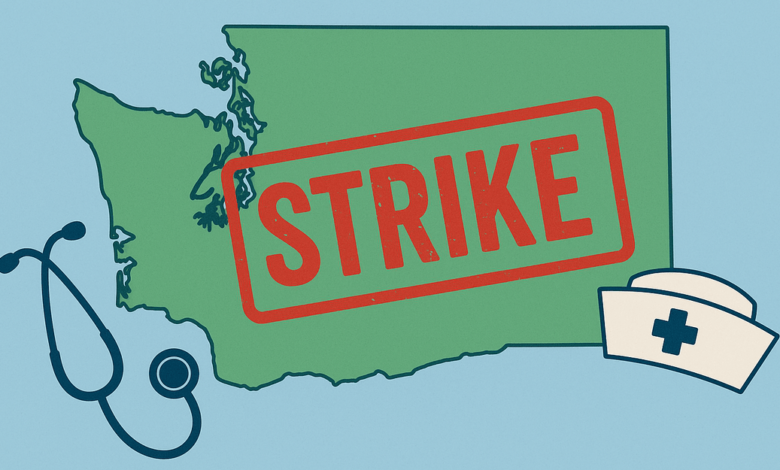Washington Nurses Can Claim Unemployment Benefits During Strikes

A landmark bill signed into law in Washington will soon allow striking and locked-out workers, including nurses, to access up to six weeks of unemployment benefits. Set to take effect January 1, 2026, this new law positions Washington as the third state in the country to provide such a safety net for workers engaged in labor disputes, following the examples set by New York and New Jersey.
Senate Bill 5041, signed by Governor Bob Ferguson on May 19, 2025, enables workers who are on strike or have been locked out by their employer to collect unemployment benefits. Here are the key provisions of the law:
- Eligibility for Benefits: Striking or locked-out workers may access unemployment benefits beginning 15 to 21 days after a strike starts, depending on the day the work stoppage begins. This includes a mandatory one-week waiting period, meaning benefits typically begin two to three weeks into a strike or lockout.
- Duration and Conditions: Qualified individuals may receive up to six weeks of benefits. If a strike concludes before the qualifying period elapses, no benefits will be paid. If workers later receive retroactive wages or if a strike is later judged illegal, any benefits received must be repaid to the state.
- Sunset Clause: The law is set to expire December 31, 2035, unless state lawmakers decide to renew it after a review in 2036.
- Employer Impact: The benefits paid to striking or locked-out workers will affect employers’ unemployment insurance tax rates. Employers will be notified of mediation resources and can make voluntary payments to minimize the financial impact on their tax rates.
Sen. Marcus Riccelli (D-Spokane), sponsor of the bill, explained: “Striking is a last resort, and this bill will help level the playing field for workers trying to exercise their right to collectively bargain for fair wages and safe workplace conditions. Affordability is one of the top issues for people in my district. This legislation will help make sure people who do important jobs and important work have fair pay, good benefits, and safe work conditions.”
April Sims, President of the Washington State Labor Council, supported the bill as well, saying: “Providing UI for striking workers will level the playing field by encouraging employers to bargain in good faith and making it harder for bad bosses to starve workers out… UI benefits will help striking workers survive while they fight for the union contract that will help them thrive.”
Joe Kendo, Chief of Staff, Washington State Labor Council, responded to concerns about encouraging strikes: “While UI benefits will be helpful for those workers who do go on strike, those benefits are not full wage replacement, so I do not believe that it would incentivize strikes.”
Opposition voices include business leaders such as Lindsey Hueer of the Association of Washington Business, arguing the law could disrupt negotiations and negatively affect the state’s unemployment insurance trust fund. “It’s inappropriate to unbalance the bargaining table in a way that forces employers to pay for the costs of a striking worker. Unemployment insurance should be a safety net for workers who have no job to return to.””
For nurses, this new law means greater security during contract negotiations, especially in cases where management stalls on issues such as safe staffing, working conditions, and pay. Historically, the risk of financial hardship from striking posed a significant obstacle to exercising collective bargaining rights. The new law aims to mitigate that concern by providing a short-term financial buffer.
A Reddit post in the r/union community captured a variety of positive sentiments about the bill, including hopes that similar legislation will pass in other states:
- “We are trying to pass a similar bill in Oregon right now as well.”
- “Pennsylvania nearly has the votes for this measure. It could be a game changer for working people.”
- “…you pretty much have to live in a blue state in order to get a tiny bit of protection, but I’m worried that it may be too late… At what point are we going to do more than strike because I’m ready”
Washington’s Employment Security Department will submit annual reports to the State Legislature, tracking the number of strikes and the cost of expanded benefits. The impact of this new policy will be closely watched, particularly by nursing unions who frequently face tough negotiations over staffing and patient care standards.
🤔 Nurses: what do you think about this new law? Share your thoughts in the discussion forum below.







